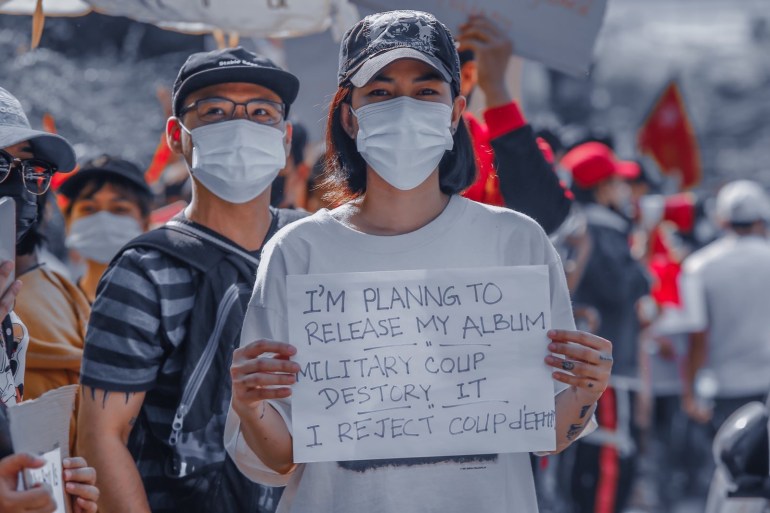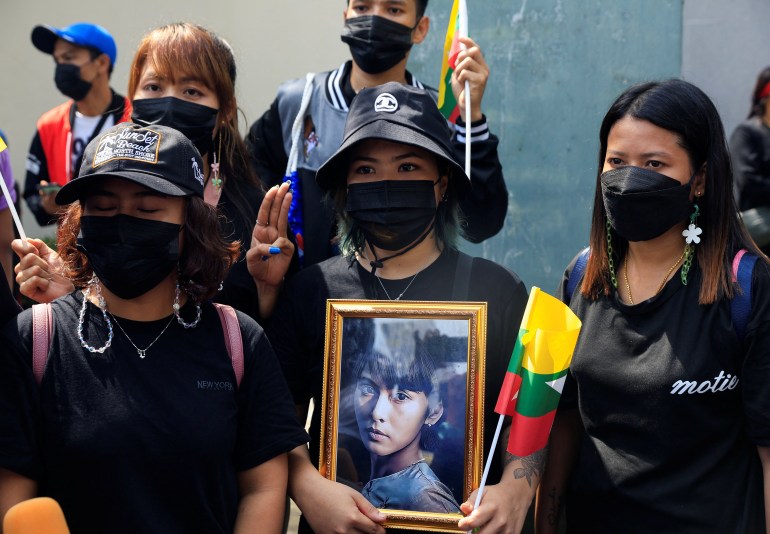Defiance in Myanmar even as executions prompt fears for detained
More than 70 political prisoners are on death row in the country and analysts fear a desperate military regime could step up killings.

When Thazin Nyunt Aung first heard that her husband had been executed by the Myanmar military, her feelings “couldn’t be expressed in words”.
But as reality settled in, so did a steely resolve.
Keep reading
list of 4 itemsMyanmar’s military says executions were ‘justice for the people’
ASEAN ‘troubled’ over Myanmar military’s execution of opponents
Myanmar executes four anti-coup activists, drawing outrage
“Now I have to do more to successfully complete this revolution,” she told Al Jazeera.
Her husband, 41-year-old Phyo Zeyar Thaw, was arrested in November 2021. The last conversation she had with him before they were separated was one they had many times before.
“It was an understanding between us,” she said. “If something happens to one of us, the one who is left behind should fight till the end.”
In 2012, then rapper Phyo Zeyar Thaw exchanged his microphone for a parliamentarian’s robe as by-elections swept Aung San Suu Kyi and other National League for Democracy (NLD) members into office as part of Myanmar’s much-heralded transition to democracy. This month, he was executed along with three other political prisoners, in the country’s first use of the death penalty in decades.
The four men, who also included prominent activist Kyaw Min Yu, also known as Ko Jimmy, were accused of organising or participating in armed resistance to the military, which seized power in February 2021 coup after the NLD had been returned to office in a landslide.
Even while he was taking a break from music to work in the House of Representatives — the Pyithu Hluttaw — Phyo Zeyar Thaw never stopped listening to rappers like Eminem and Snoop Dogg. He decided not to seek reelection and return to his musical career in 2020, believing the country was on the right track.
Thazin Nyunt Aung said one of her fondest memories with her husband was the night of November 8, 2020, when the election results came in.
“Zeyar Thaw didn’t participate in that election, but he still campaigned for the NLD,” she explained. “During the campaign, I went together with Zeyar Thaw and met a lot of people who believed in his political views and loved him and trusted him.”

A member of activist collective Rap Against Junta said the last time he saw Phyo Zeyar Thaw was the night before the coup when they went out to eat grilled pork ribs together in Yangon. Despite his decision not to seek reelection, he did not disavow his time in politics.
“He told me being an activist you can only pressure for the cause. Being a politician, you can literally cause the change,” he said.
He says despite Phyo Zeyar Thaw’s fame, he was always down to earth and encouraging to young people in the hip-hop scene. “He knew the new generation are the ones that [are] going to shape a country’s future,” he said.
Fears of more to come
The executions have sparked fears that other political prisoners are also in imminent danger.
More than 70 people are on death row (others were sentenced in abstentia) for opposing the coup, including nine women, according to the Assistance Association for Political Prisoners (AAPP), which has been tracking the military’s crackdown. AAPP says more than 2,100 civilians have been killed by the military since the coup, including dozens who have died in military custody.
AAPP director Bo Kyi said it is “more dangerous” to be a political prisoner now than during any other anti-military “uprising” in Myanmar’s history. “The penal institution is used as a weapon to oppress the people,” he said.
When asked whether the military was likely to use the death penalty again, he said it was “difficult to predict any rational process” from the military government. But he says it is clear that “the more desperate they are, the more brutal they become”.
Burmese-American journalist Nathan Maung, who spent three months in prison for reporting on the coup, says he fears more than 100 others could be executed.
“I am deeply concerned for my colleagues and friends in prisons,” he said, saying the executions will have sent a chill of fear not only through the jails but also through the country.

Since the killings, unverified rumours have circulated in a frenzy on social media. One claims that three more prisoners have already been secretly executed, another that 41 would be executed imminently. When prominent protest leader Wai Moe Naing, who has been accused of murder with little evidence, was allowed to meet his mother this week, many feared it was for a final goodbye.
Meanwhile, most of the overthrown NLD’s senior leadership – including the beloved State Counsellor Aung San Suu Kyi, President Win Myint and Mandalay Chief Minister Zaw Myint Maung – remain in military custody.
Political analyst Khin Zaw Win says “anything is possible” under the generals’ self-styled State Administration Council. “Last year there were concerns for Aung San Suu Kyi’s safety and even life,” he said.
He says the executions could represent desperation and the military’s desire to “avenge its own substantial losses in battle”.
Since the coup, resistance to the military has exploded across Myanmar, as newly formed anti-coup armed groups team up with more established ethnic armed groups which have fought for political autonomy for decades. Their success on the battlefield has surprised analysts and probably the military itself, which has been unable to assert administrative control over large swathes of the country.
“It’s like saying – ‘if you keep up the attacks, we’ll kill the prisoners we’ve taken’. A POW’s life is worthless in the military’s scheme of things,” Khin Zaw Win said, adding that from the military’s “flawed point of view” the people on death row are “the most dangerous”.
Calls for international action
International condemnation has been swift and severe.
As chair of the Association of Southeast Asian Nations (ASEAN), Cambodia penned an unusually stern letter condemning the timing of the executions – just a week before an ASEAN summit – as “highly reprehensible” and showing a “gross lack of will” to resolve the crisis.
The 15-member United Nations Security Council, which includes the military’s leading arms suppliers China and Russia, also unanimously condemned the move, as did the G7.
Bo Kyi says the international community must take action to prevent more violence.
“Our neighbours have a duty to stop these atrocities in Burma,” he said.

The executions came just days after the Cambodian foreign minister suggested upgrading the military’s representation in the regional bloc.
Since October 2021, military leader Min Aung Hlaing and his foreign minister have been barred from high-level ASEAN summits, but lower-level ministers have been allowed to continue participating in meetings. Now Malaysia, which has taken the lead on pushing back against the regime, has suggested excluding all military-appointed ministers. It also condemned the killings as a ‘crime against humanity‘.
But Nathan Maung says the international community has so far been all talk and no action.
“I believe that the Myanmar military realised that the international community will do nothing against them. … I would blame the international community including ASEAN and Burma’s immediate neighbours China, India and Thailand,” he said.
While Cambodia has been pushing for negotiations between the military and its opponents, Khin Zaw Win says the executions have made that “impossible”.
“Anyone proposing that would be considered insane,” he said.
Far from backing down, the military has defended the executions, saying the men “deserved many death sentences”. Plainclothes mobs gathered to throw stones at the homes of the executed activists’ parents. The military has also refused to return the bodies or tell the families when exactly they were killed, hindering Buddhist religious ceremonies for the dead.
“This shows the extreme cruelty of their nature and is an extreme human rights violation also for the families,” said Thazin Nyunt Aung, adding that it may be a tactic to make other opponents of the military government even more afraid.
“It’s in fact not a judicial execution, it’s just murder. The military wants everyone who fights against them to be dead, and they only want power and wealth in their own hands.”